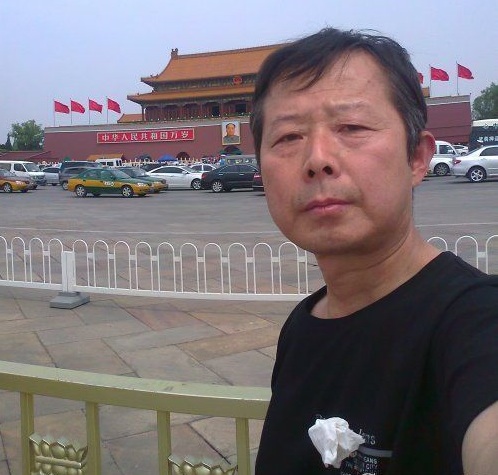by Tienchi Martin-Liao / June 25, 2014
Between Germany and Beijing: Tiananmen Square’s increasingly complex politics.

Zhu Xinxin white flower crop
Zhu Xinxin poses outside of Tiananmen Square shortly before the white flower pinned to his shirt was confiscated by police. Photo: Courtesy of Tienchi Martin-Liao via Boxun.com.
The vigil held in Hong Kong on June 4 for the victims of the 1989 Tiananmen Square Massacre was an incredible sight. Over 100,000 people came together, holding candles, to commemorate the 25th anniversary of the Massacre. It was moving to see so many people still keeping the tragedy at Tiananmen alive in their memory and some of the young people present hadn’t even been born when the massacre occurred.
Hong Kong nominally belongs to China, but fortunately it still enjoys freedom of expression and assembly, unlike mainland Beijing, where the Massacre took place over two decades ago. Even though memorials were held worldwide, the only place that lay quietly ignorant of this anniversary was the place where the tragedy actually happened–Tiananmen Square.
On June 4, the Square was heavily barricaded. Armed soldiers guarded all of the streets leading to it and police cars besieged the area. The whole place swarmed with police, security guards, and plainclothes officers. Anyone who wanted to enter Tiananmen Square had to show identification and any attempt to memorialize the “Tiananmen incident” was nipped in the bud. For example, the Tiananmen Mothers, who wanted to lay flowers at the Muxidi Bridge, where their sons or husbands had been killed, were quickly prevented from doing so.
Despite the high alert, former Tiananmen student leader Zhou Fengsuo successfully visited the square on the eve of the anniversary, though only for a short time. The very next day he was deported back to the United States, where he resides.
Another activist, Zhu Xinxin, had just enough time to pin a white flower to his shirt and take a picture before police confiscated the flower.
In the weeks leading up to the anniversary international media published articles about the Chinese government’s numerous preventive arrests of dissidents and activists. Western governments also released statements criticizing the bloody crackdown on the democratic movement a quarter century ago.
However, one particular article by the Beijing-based, German journalist Frank Sieren took a radically different approach to reflecting on June 4. In his article, published by the German broadcasting company, Deutsche Welle, Sieren attempts to whitewash the atrocities committed by the dictatorial regime. He calls the Massacre a historical “slip,” and accuses western media of exaggerating the events that took place at Tiananmen Square in 1989. In the piece he stresses:
